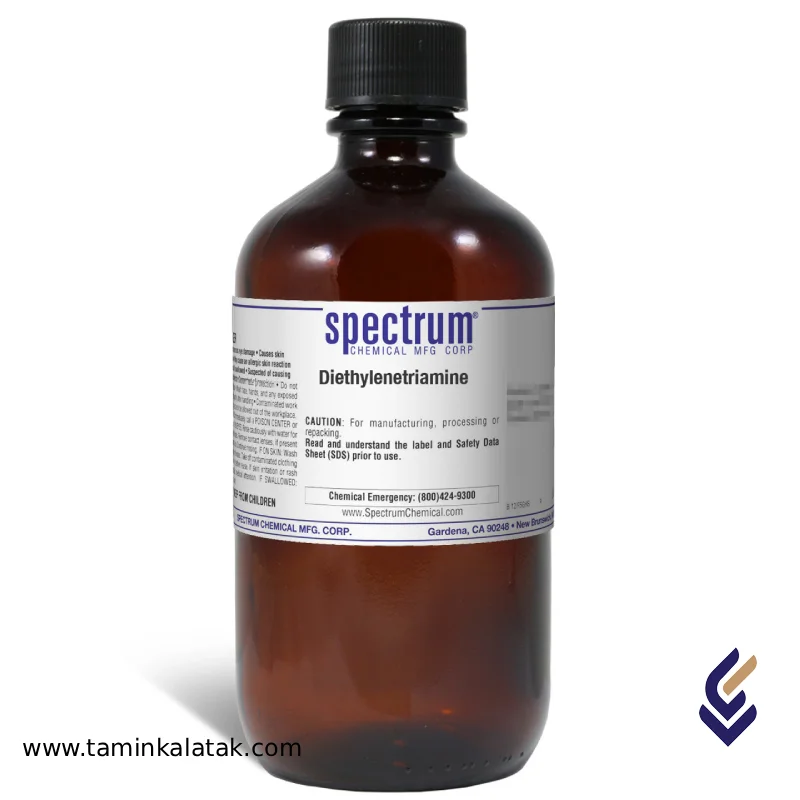Di Ethylene Tri Amine
Diethylenetriamine (DETA) is a trifunctional aliphatic amine (triamine) appearing as a colorless to pale-yellow liquid with a strong ammonia-like odor.
It serves as an epoxy curing agent, chelating agent, and acid gas absorber, making it a key raw material in resin, gas treatment, and specialty chemical industries.
Chemical Structure
-
Molecular Formula: C₄H₁₃N₃
-
Molecular Weight: 103.17 g/mol
-
Structural Formula: (NH₂–CH₂–CH₂)₂–NH
-
IUPAC Name: N′-(2-aminoethyl)ethane-1,2-diamine
-
Chemical Family: Polyamines
Typical Physical and Chemical Properties
| Property | Specification |
|---|---|
| Appearance | Clear to light-yellow liquid |
| Odor | Strong, ammonia-like |
| Boiling Point | 207–208 °C |
| Flash Point (closed cup) | 94–98 °C |
| Density (20 °C) | ~0.955 g/cm³ |
| Viscosity (25 °C) | ~2 mPa·s |
| Refractive Index (nD 20 °C) | 1.474–1.476 |
| pH (1% solution) | 11.5–12.0 |
| Water Solubility | Completely miscible |
| Hygroscopicity | Absorbs moisture from air |
Advantages
-
High reactivity with epoxy resins, enabling rapid and efficient curing
-
Functions as a tridentate ligand in metal coordination chemistry
-
Excellent CO₂ and H₂S absorption capacity for gas sweetening applications
-
Highly water-soluble and compatible with polar solvents
-
Economical and widely available in industrial grades
Limitations
-
Strongly corrosive to skin, eyes, and respiratory tissues
-
Hygroscopic – requires moisture-proof packaging and handling
-
May oxidize and discolor on exposure to air and light
-
Heavier-than-air vapors may accumulate in low areas, posing inhalation risks
-
Pungent odor can limit use in enclosed environments
Main Applications
-
Epoxy resin and adhesive systems: curing agent for coatings, composites, and adhesives
-
Coordination chemistry: ligand for forming complexes (e.g., [Co(dien)(NO₂)₃])
-
Oil & gas industry: absorption of CO₂ and H₂S in gas treatment units
-
Additive manufacturing: corrosion inhibitor and lubricant additive
-
Polymer chemistry: precursor for polyamides, polyimides, and specialty resins
Safety and Handling
UN Number: 2079 Hazard Class: 8 (Corrosive) Packing Group: II
GHS Classification:
⚠️ Signal Word: DANGER
Hazard Statements:
-
H302: Harmful if swallowed
-
H312: Harmful in contact with skin
-
H314: Causes severe skin burns and eye damage
-
H317: May cause allergic skin reaction
-
H334: May cause respiratory sensitization
Recommended PPE:
-
Nitrile or butyl rubber gloves
-
Chemical-resistant goggles or face shield
-
Protective clothing
-
Respirator or air filtration system in enclosed spaces
Storage Conditions:
-
Store in tightly closed, corrosion-resistant containers
-
Keep in a cool, dry, well-ventilated area (preferably below 15 °C)
-
Avoid contact with strong acids, oxidizing agents, and moisture
-
Protect from heat and direct sunlight
Summary
Diethylenetriamine (DETA) is a highly reactive, multifunctional amine widely used in epoxy resin curing, gas absorption, and chelation chemistry.
It offers excellent reactivity, solubility, and cost-effectiveness — provided it is handled under controlled, corrosion-safe, and well-ventilated conditions.
Applications
| Applications | , , , , , , |
|---|
Di Ethylene Tri Amine
| Products | Grade | Vapor pressure | Physical appearance | Density (at 20°C) | Melting point | Solubility in water |
|---|---|---|---|---|---|---|
| N'-(2-aminoethyl)ethane-1,2-diamine Diethylenetriamine (DETA) | Industrial, laboratory, high purity 98–99% in Sigma-Aldrich grade | 0.2 – 0.4 mmHg (≈ 26 – 53 Pa) | Colorless to pale yellow liquid, with a strong ammonia odor. | 0.952 – 0.955 g/cm³ | ≈ –39 °C | Completely soluble |







